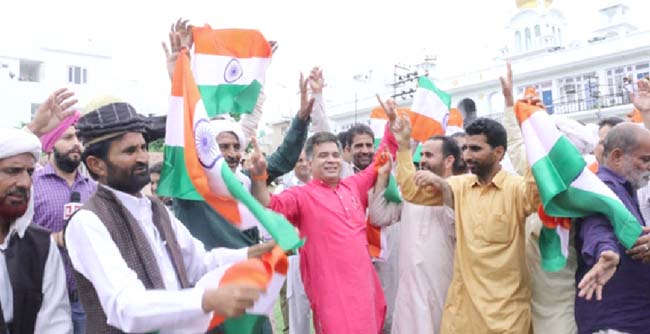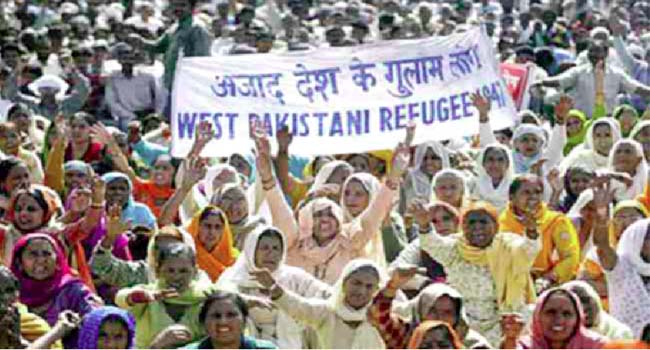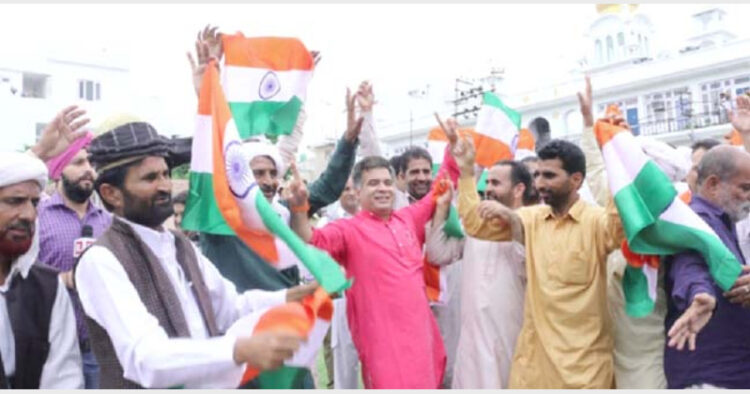The new Domicile law has come as a great relief to all those who have been living for generations in the State but were denied basic citizenship rights as they did not fit into the State government’s interpretation of Article-370 that would have qualified them to be accepted as ‘permanent citizens’ or ‘State Subjects’

Residents of Jammu & Kashmir welcome the changes to the state’s Domicile Law
As expected, the newly adopted Domicile Law in the newly carved Union Territory of Jammu & Kashmir on 16th May this year has drawn contrasting reactions. While it has received great applause from hundreds of thousands of estranged sons of the soil, it has also invited equally strong opposition from pro-Pakistan and anti-India Kashmiri groups, Kashmiri separatists, a vocal section of Kashmiri political leaders as well as their supporters and cheerleaders among a section of Indian media and such activists who claim to champion human rights of Kashmiri people, including the separatists and terrorists.
This new law is, obviously, a result of Parliament’s decision to strike out Article-35A from Indian constitution and defanging of Article-370 from which the Assembly of J&K drew special and extraordinary powers. Breaking up of the State into two separate Union Territories has further given all the powers to the Centre to make necessary administrative changes in the UT of J&K.
The proponents of this new Domicile law claim that it is going to rehabilitate democracy in the State and its true sense and will rescue the State from imminent and a well-organized slippage into an Islamic state which would have been inimical to the integrity and sovereignty of India as well as the Indian spirit of democracy and secularism.
Relief for Sons of Soil
This new Domicile Law has reopened gates for nearly a dozen groups of Indian citizens to seek domicile status in J&K who have been perpetually denied it by the State governments over the past seven decades. These groups include those citizens of J&K who are living out of the State for various reasons since decades. It has come as a great relief to all those who have been living for generations in the State but were denied basic citizenship rights as they did not fit into the State government’s interpretation of Article-370 that would have qualified them to be accepted as ‘permanent citizens’ or ‘State Subjects’. The new law also offers domicile rights to those officers and employees of the Central Government, Public Sector Undertakings, Central educational and scientific institutions etc. who have given lifelong or more than ten years of service to the State. Mr Daya Sagar, a leading thinker from Jammu, has advised the Central government also to bestow domicile rights as an honour to those 21 brave Indian soldiers and their families who were decorated with Param Vir Chakra while protecting India and J&K on the borders along with State.
Undoing a Demographic Blunder
A vocal section of Kashmiri political leaders, separatists and their supporter in New Delhi have branded this decision of the Central government as a ‘blatant move to change the demography of the State’. This worry of this section of political leaders, separatists and their ideological supporters looks somewhat valid because the new laws are surely going to put all such practices in reverse gear which have been blatantly in vogue in the State with the sole aim of ethnic cleansing of the State, especially the Kashmir Valley. This happened because the Article-370 provided a constitutional tool to the Kashmir Valley dominated government of the State to define at its own pleasure who shall qualify as the ‘citizen’ of J&K and who shall not.
The new law will truly rehabilitate democracy in J&K and rescue it from imminent and a well-organised slippage into an Islamic state
Article 370 – A tool of Islamic Agenda?
A contrasting case of Hindu and Sikh refugees from Pakistan Occupied J&K in 1947, and those Muslim refugees who came from East Turkistan and Tibet following the occupation of their respective countries by China in 1949 and 1951 is a perfect example of this blatantly Islamic interpretation of Article-370. Following Pakistani attack on J&K, late Sheikh Abdullah did not permit the hapless fleeing Hindu and Sikh refugees from next door Muzaffarabad to stay in Kashmir Valley on the plea that their presence in the Valley would “dilute the Kashmiri character” of the Valley. Soon after Indian forces pushed back Pakistani attack on the State, the Sheikh, as the “Prime Minister of the State”, took many steps to ensure that a significant section of fleeing refugees from Muzaffarabad, Mirpur, Bhimbar, Kotli, Ali Beg, Dev Batala etc. did not settle in Jammu and pushed them over to Punjab.
In later years all the State governments have denied these refugees the status of ‘State Subject’ on one or other ground. But in sharp contrast to this, all Muslim refugees from East Turkistan (Chinese name ‘Xinjiang’) and Tibet were formally given ‘State Subject’ status by the J&K Assembly. Close scrutiny would reveal that hundreds of Pakistani ‘Mujahids’ who stayed back in J&K following Pakistani operations during the 1960s as well as thousands of especially invited hardcore ‘Maulvis’ from UP and Bihar were absorbed either as teachers in J&K government-run schools or appointed ‘Maulvis’ in mosques across the State with full citizenship rights.
However, sign of an influential section of J&K bureaucracy’s attempts to sabotage this process are causing concerns among those persons and families who qualify under the new domicile law. Madan Mohan Gupta, General Secretary Mirpur Balidan Bhawan Samity, a leading community orgsnization of POJK refugees from Mirpur, has written a letter to the Lt. Governor pointing out how deliberate attempts are being made by some officers, responsible for processing online applications from applicant domiciles, to sabotage the entire process. The letters gives many examples where the domicile applications have been rejected on contradictory grounds. “We were thrilled when PM Modi and Home Minister Amit Shah announced the new Domicile Law to fulfill our seven decades old demand. But we are now facing the old reality of ethnic bias of J&K rulers in its new form now. It appears that an influential section of J&K bureaucrats is bent upon failing this process which Modi and Shah have started. The POJK refugees and their descendents have been given only one year to complete their registration process as domiciles. But these bureaucrats first wasted 70 days in launching the application process. And now they are systematically demoralizing us by rejecting application on flimsy and even self contradictory grounds”, he says.
A Delimitation Blunder
This ‘Islamist’ character and conduct of the J&K government draws its real power from the lopsided composition of its Assembly. As a practice since the 1950s, the current 111 member State Assembly holds elections only on 87 seats and keeps 24 seats permanently vacant in the name of POK. For whatever reasons, Kashmir Valley has been assigned the lion’s share of 46 seats while Jammu has 37 and Ladakh had to manage with only 4 seats. Thanks to permanently vacant 24 seats of POK citizens, this system keeps the final legislative power permanently in the hands of Kashmir Valley. This legislative arrogance has taken serious and blatantly communal dimensions over past three decades following the Kashmiri Pandits, and Kashmiri Sikhs were violently thrown out of the Valley by Islamist Jihadis of the Valley. That has left the Kashmiri section of the Assembly filled perpetually with 100% MLAs from the Muslim community who now hold absolute control of the State Assembly.

The new Domicile law solves the 73-year-old human rights
issue of POJK refugees displaced from Pakistan in 1947
issue of POJK refugees displaced from Pakistan in 1947
Nazi like ‘Constitutional’ Practices
This looks absurd and irrational as against those nearly two million helpless sons of the soil who stand disfranchised due to denial of citizenship rights. The new Domicile law is surely going to undo some of the most shameful, inhuman and immoral practices of the State government which have been in vogue for nearly seven decades. In the absence a ‘Permanent Resident’ status many communities which include all Hindu refugees who crossed over to Jammu from nearby Rawalpindi; members of ‘Balmiki’ community who were personally invited and persuaded by late Sheikh Abdullah in 1956 to migrate from Punjab; the Gorkha soldiers of erstwhile Maharaja’s Army living in the State for over a century; daughters of J&K who decide to marry an outsider and; POJK refugee who is living outside J&K are barred from buying any immovable property in the State; seeking employment in State government establishments; acquiring membership of cooperatives or taking a loan from banks or getting their children admitted in higher education institutes of the State government. As citizens of India, they can vote in Lok Sabha elections but are not entitled to vote or contest State Assembly, Panchayats or Nagarpalika elections. The State laws don’t even permit them to avail central government facilities entitled to SCs or STs. Not even entitlement to Central welfare schemes like the Indira Awas Yojna.
The treatment meted out to children of the Punjabi Balmiki ‘Mehtar’ (night soil cleaners) families on the grounds of Article-370 has such inhuman dimensions which would put even Hitler’s Nazi Germany to shame. Until recent years the birth and identity certificate of children of these families used to bear stamp which announced that the holder was entitled only to a sweeper’s job. It applied even to those youths whose families somehow manage to send them to nearby Punjab or other states to earn an MBA or medical doctor’s degrees. Similarly, the husband, as well as children born to a woman of J&K who decides to marry a man from other State, are not only barred from owning property of her ancestral family, they are also barred from enjoying any facility like employment or higher education as entitled to normal citizens of J&K. In sharp contrast, thousands of Muslim grooms from Pakistan other Indian states have been quietly bestowed with permanent citizen rights.
That explains why those sons of the soil have welcomed practical nullification of Article-370 and now the domicile law. They remained disempowered because of communally partial and Islamist attitude of the State government over past seven decades. Now the application of the new Domicile law is not only bound to smash the fountainhead of Islamist communalism in J&K, but it is also inevitably going to rehabilitate true secularist democracy in the State by providing a level playing field for all citizens of this State.
(Author is a senior journalist and Chairman, Centre for Himalayan Asia Studies and Engagement ‘CHASE’)













Comments